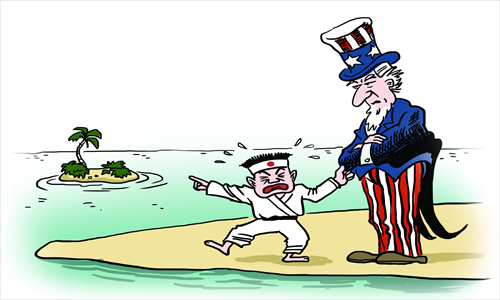Japan’s politics overwhelm strategic insight

US Deputy Secretary of State William Burns visited Japan Monday, and the Japanese media eagerly highlighted that Japan and the US reached a consensus on dealing with China on the same day.
By now, the Diaoyu Islands dispute has become a key point in Japan's strategic decisions, reflecting Japan's ability to influence the US policymaking by actively making use of its strategic capital. Such a dangerous trend should be closely watched.
Since the end of World War II, ensuring US interests in East Asia through consolidating the US-Japan alliance has become one of the foundations for the US strategy toward Japan. This could be seen in the Treaty of Peace with Japan and the Treaty of Security and Safeguard between Japan and the US.
For more than 60 years, the US has been consistent in its Japan policy, aiming at making Japan act in concordance with the US and turning Japan into an "Asian Britain."
We need to grasp this background to understand why Japan depends on the US to "blackmail" China over the Diaoyu Islands dispute.
The US seems to dominate the US-Japan alliance, but based on some "hidden rules," the interests of the US and Japan in the West Pacific region are mutually checked.
The US can use the military bases in Japan only with the agreement of Japan, which gives Japan the flexibility to decide whether it should support the US "regional intervention" based on its domestic political situation. If Japan doesn't have the political will to support the US, the US cannot easily intervene in the regional affairs.
Since 2005, the US and Japan have both taken China as a potential enemy, and this has become another factor influencing US strategy toward Japan.
This strategic foundation was once controversial between the US and Japan. However, judging by reports such as The US and Japan: Advancing toward a Mature Partnership, issued during the first term of former US president George W. Bush, and the 2006 Quadrennial Defense Review by the US Department of Defense, and the Obama administration's Asian pivot strategy since 2009, such a strategic foundation has gained a dominant position in the US-Japan alliance.
China replaced Japan as the world's second biggest economy in 2010, which made Japan increase its precautions against China. For one thing, Japan demands more interests in its alliance with the US, such as enabling its Self-Defense Forces to go overseas.
Moreover, Japan has begun to deliberately stir up tensions in China's neighboring area. For example, Japan included the Diaoyu Islands issue into its national oceanic development strategy and made the decision to "nationalize" the Islands.
However, with the balance of power shifting among the US, Japan and China in the East Asian strategic pattern, Japanese hopes that the US will sanction its occupation of the Diaoyu Islands are very likely to be defeated.
The strong Japanese dependence on Chinese markets and the issue of the wisdom of strategically containing China are controversial enough to upset both Japan and the US after the elections and stimulate fierce policy debates.
One of the purposes of the US return to Asia is to revive its manufacturing industry by seeking a leading role in East Asian economic growth and regional division of labor.
Therefore, while making its regional strategic decisions, the US cannot simply overlook emerging powers like China. It has to take long-term development into consideration.
Japan's attitude and actions over the Diaoyu Islands dispute reflect that the country's political problems have overwhelmed its economic problems. If such an unbalanced situation cannot be curbed, it will not only harm Japan itself but also threaten other regional nations.
Today China has the resolution and strategic will to safeguard its sovereignty, Japan should remember this.
The author is a researcher with the Shanghai Institutes for International Studies. opinion@globaltimes.com.cn